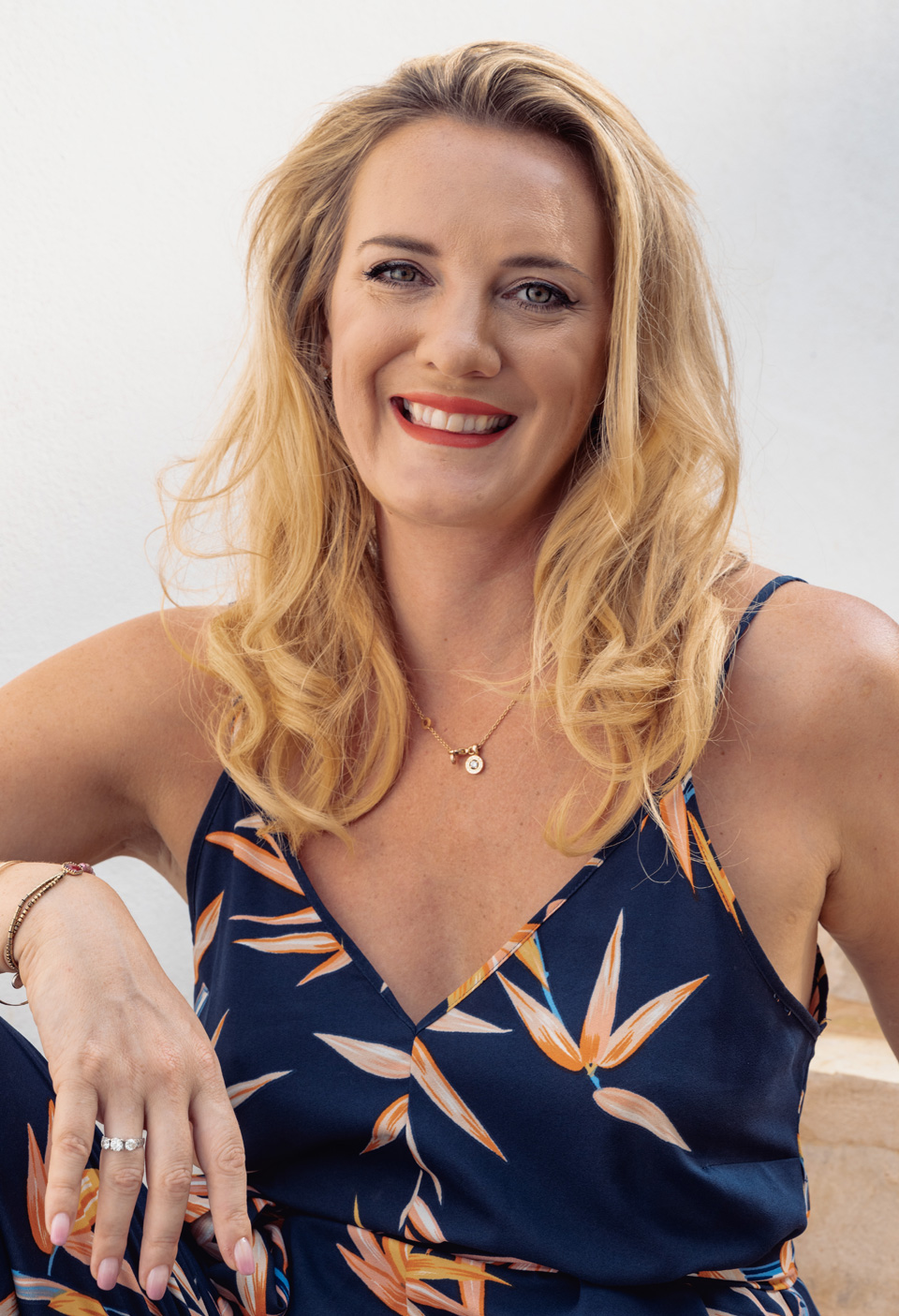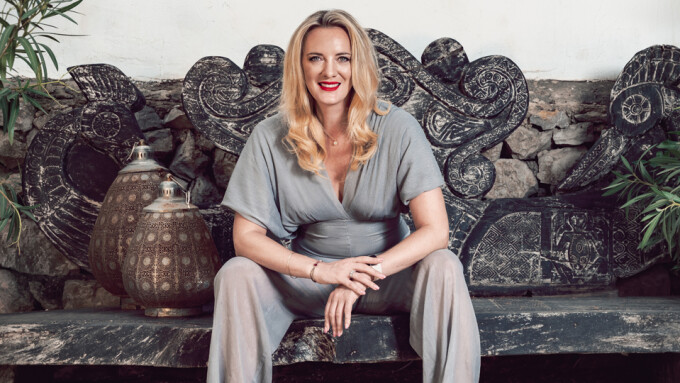The following interview touches on issues related to depression and anxiety. Certain topics may be triggering.
Leya Tanit understands. The founder of Pineapple Support knows all about financial stress. She has felt the unique pressures involved with juggling the demands of a public persona with the everyday needs of a normal, private citizen. Whether a performer grew up in Newcastle upon Tyne — her hometown in North East England — or in Bucharest, Bogota or Boston, Tanit knows all about the ups and downs of building a business in adult entertainment. It’s not easy to start from scratch with any kind of business; add in the lingering stigma involved with open displays of erotic expression and sexual health and wellness and it’s easy to feel overwhelmed.
It was when she attended an XBIZ conference in Los Angeles in early 2018 that Tanit learned about a distressing number of recent deaths in the performer community, including several from suicide. She saw how friends and colleagues were still reeling from the losses and felt compelled to do something to help. Within a few weeks, she’d dreamed up a loose framework for a mental health service for the adult industry; a few months later, Pineapple Support — so named because “Pineapple” is a commonly used safe word in BDSM sessions — was launched.
Three and a half years later, the organization’s network includes dozens of qualified therapists — each one personally vetted by Tanit herself — across the globe. More than 60 adult businesses and organizations have publicly pledged support and resources to Pineapple Support and the group has connected over 5,000 performers and industry members to mental health services, including free and low-cost therapy, counseling and emotional support.
It was in June 2019 when XBIZ published the industry’s first-ever comprehensive analysis of mental health and wellness among the performer community. “Listen to us” was a common theme. We took their advice.
“There was genuine concern that fans and industry colleagues alike would not want such emotional fraught topics to potentially spoil their sex-doll fantasies,” we wrote two and a half years ago. “But as XBIZ prepared this issue to go to print, the news began to circulate of the sudden, shocking death of yet another performer … it is impossible to know what the industry could have done to help them. But the tragic news underscored the pressing importance of this conversation. We’re listening. And so should you.”
For this story, we spoke to Tanit about her life experiences that led to the formation of Pineapple Support and its evolving mission; we also reached out to several of the group’s therapists for advice and guidance. We’re listening. And so should you.
ONE THING AFTER ANOTHER
As we chat via Zoom — me in Los Angeles, Tanit from her home in Spain — we both initially fumble our words as we attempt to contextualize recent events in the industry in a mid-pandemic world with updates that seem to arrive on an hourly basis.

“We haven’t come to an outcome yet,” Tanit observed. “Everything’s still unfolding. We’re not out of the woods with this by any means. But at least we have a slightly better idea of what’s happening, I think.”
After a year and a half of being largely isolated, the world is fumbling back to some kind of normalcy. All of us are adjusting to how to live and love and run our businesses. Those who work in adult are no different, but the unique stresses of working in adult bring added pressure, particularly for performers. Those who shoot studio content have been cut off from familiar colleagues, from makeup artists to production assistants and co-stars, while cam models, who typically perform in isolation, found themselves with an ever-increasing audience desperate for entertainment and companionship.
“Honestly, it’s been a hell of a year,” Tanit states flatly. “Not just with the past 18 months of the pandemic.” She cites the social unrest surrounding the #BlackLivesMatter movement and the shocking announcement by OnlyFans that it would ban sexually explicit content. The popular fan site, upon whom hundreds of thousands of sex workers depend for their livelihood, swiftly reversed their decision. The reverberations, however, continue to echo throughout the performer community.
“For the industry, it’s been one thing after another,” said Tanit. “We’ve had a huge rise in the number of people who need our resources. We’ve gone from around 60 requests a month to averaging 350-380, which is a hell of a rise. I’m so grateful we’re established enough to be able to deal with this influx because otherwise we would be in an uphill battle we couldn’t fight.”
She notes that the most actively requested workshops and seminars sponsored by Pineapple Support over the past year have been related to trauma and PTSD, known to be aftereffects of a pandemic.
Tanit also revealed that the response to Pineapple’s support groups related to burnout has been “like no other,” particularly at the start of the pandemic and again lately, as society adjusts to a new landscape. During the pandemic, most of our normal stress-relief routines suddenly became unavailable and we all made a painful adjustment. As the weeks and months rolled by, new habits became new routines. Now, Tanit continued, another uncomfortable shift is taking place.
“Now we’re going back to work and to some kind of normalcy and that’s quite terrifying,” she said. “We’ve got into the habit of doing something else. For a lot of people, they’ve gone back to putting 150% into their work and suddenly realized they’ve lost their work-life balance and they’re quickly burning out.”
POURING FROM AN EMPTY CUP
Often, burnout — emotional, mental, physical — happens in what feels like a short amount of time, explained Pineapple therapist Rachael Farina. Therefore, it's important to remember that there are signs to recognize when burnout starts to rear its head. This way, performers, in particular, won't reach a point where they do feel stretched.
“I always recommend doing a daily check-in that can be integrated into a normal part of a routine,” Farina said. “It's important to do a check-in on your physical well-being in addition to your mental well-being as they're intertwined.”
Farina noted that rating one’s mental and emotional well-being on a 1-10 scale is a helpful method for identifying trends across days, weeks and months.
“Sometimes you're able to more quickly identify when you're reaching a point where you feel burned out,” she said. “Journaling is also a great way to check in with yourself. It allows you to engage in an act of self-care while also maintaining a reflective journal.”
Feeling stretched mentally and emotionally occurs when we don’t have capacity to engage with friends, family or clients in ways we normally do. Emotional burnout may also be present when mental health symptoms increase in both intensity and frequency, such as feeling more irritated than usual, isolating more often and losing interest in performing or in other activities that you normally enjoy.
“At the end of the day, I always tell my clients that no one knows you the way you know you,” Farina said. “If you take the time to check in with yourself with the same courtesy you give to your loved ones, you can avoid reaching this point where you feel stretched mentally and emotionally.”
Pineapple therapist Silva Neves added that changes to one’s normal routine, such as shifts in eating habits and sleeping patterns, can be a sign of feeling emotionally and mentally stretched.
“Typically, people report having less good quality of sleep, overeating or eating less. They might also feel exhausted all day long even if they did have a good night's sleep,” Neves said. “Some may experience a low mood on more regular occasions and start to notice negative thoughts on more occasions. For example, thoughts like ‘My life is a mess,’ ‘Everything is hard,’ ‘I’m fed up with it all’ and ‘Everybody is disappointing.’” Neves noted that most people can manage rough patches without therapy. However, a performer should seek therapy if they feel isolated and unable to speak to someone about how they feel, or experience symptoms such as panic attacks, suicidal thoughts, dissociation, acute anxiety or memories of trauma that involuntarily resurface.
“Some performers may not want to wait until they're experiencing difficult emotions to see a therapist; some may want a confidential space to talk about whatever is bothering them,” Neves added. “Most people like to have that special one-to-one space to talk, but group therapy may be powerfully healing for some performers. It is important to note that group therapy is not about performing, but about being authentic and sharing emotions and thoughts from a place of vulnerability.”
Due to the nature of their work, performers — especially cam models — often feel the pressure to show up for themselves and others when they don’t feel like “the best version of themselves,” Farina observed.

She has noted two issues related to performers seeking help.
"People seek services, for lack of a better term, when the shit hits the fan, rather than approaching therapy as a tool for collaboratively dealing with challenges as they arise,” she said. “Instead, they seek services when it’s no longer bearable. Although this doesn’t necessarily mean therapy won’t be helpful, clients may face greater barriers on their journey to healing.”
Farina has also observed that clients often do not seek help because “they think they’re not worthy of receiving it — that they weren’t ‘bad enough’ to come to therapy. This is problematic. ‘Bad enough’ is purely subjective and creates a narrative that therapy is only for those with extreme symptoms of mental illness.”
Farina understands that sex workers who avoid seeking services may largely do so due to fear associated with judgment. Pineapple Support rigorously vets its therapists to manage this concern.
She described one-on-one versus group therapy as “two separate, but wonderful resources for performers. In conjunction with each other, they serve as great tools to help performers struggling with mental health and substance use challenges.”
While individualized therapy can be healing for those who need one-on-one attention, group therapy can be especially helpful for sex workers as a way to connect and share stories and experiences with other performers. Groups can also serve as a safe space for performers to discuss industry-specific challenges with those who understand and do not judge, which is the kind of support network they need.
Pineapple therapist Jeremy W. Gunn described a tendency among individuals, particularly performers and industry members, to shrug off feeling stretched too thin as “a normal consequence to working hard or being productive.”
Symptoms can include increased irritability with themselves and others, not being able to achieve restful sleep, feeling drained all day, frequently losing focus on the task at hand and not having enough energy to get through the day.
“Everyone has their threshold as to when they need to seek out help,” said Gunn. “As far as individual or one-on-one versus group therapy, look at how open you feel you can be in a setting with others or if you feel you need more privacy. Some individuals thrive off of interacting with others and gain more, therapeutically, when there are varying interactive points of view and [the ability] to connect with others for support outside of the group sessions. Other individuals may be more reserved and want specific, in-depth exploration without the ‘distraction’ of others’ experiences, a much more personalized approach.”
Tanit said adult industry workers face unique challenges because so many are their own boss and don’t necessarily have work-life separation, an office in a place separate from where they live or a human resources department to help set and maintain boundaries.
“When you’re your own boss, to be successful you have to work more than anyone else would do,” she observed. “You’ve got to really, really work — you’ve got to do your own finances, your own social media, every single little bit. So, to say to someone, ‘Just don’t work so hard!’ — it’s not an easy thing to do when it’s your own livelihood and you can see the difference when you take a little time off and the money starts going down. How do you prioritize?”
She notes Pineapple has done numerous presentations, and held many, many internal discussions on this particular topic. Tanit herself admits to struggling with the standard recommendation to simply put down the phone for a length of time and stay away from scrolling through social media and sorting emails.
Tanit referenced a recent XBIZ Berlin panel about burnout, where model and producer Nyssa Nevers and performer Nyxon discussed the tricky task of “managing the expectations of your clients.” For example, accepting a custom clip request and delivering immediately can create an expectation that might prove impossible to maintain over the long haul.
“Even if your custom request is ready, wait another week before you give it to them,” Tanit advised. “You’re managing their expectations for the future and you can give yourself a break when you need a break.”
Tanit returned to her own personal struggle with stepping back and setting boundaries. She regularly explores the topic with her own therapist. When Pineapple was first launched, for example, she was online constantly.
“I was on every social media channel all the time making sure no one needed us at that exact moment,” she recalled. “My therapist told me, ‘This is not a crisis hotline. You don’t have to be there 24/7.’ It wasn’t good for me and it wasn’t good for managing expectations, particularly when most of the performers are on the West Coast of America, which is a nine-hour time difference from Spain. I was constantly waking up at 4 a.m. and checking my emails.”
Many performers, particularly those who cam, develop a deep connection with their fans and followers; they become confidantes. Particularly over the past 18 months, during the pandemic, Tanit observed, they often became someone’s lifeline.
“It’s a lot of responsibility,” she said. “But content creators aren’t qualified therapists; knowing how to provide active listening without giving advice, maintain boundaries and not take on someone else’s emotions is not something they’ve been trained in.”
“Also, every therapist has a therapist,” Tanit added. “Many content creators, many models, don’t have that. So they’re taking on a lot without being trained about how to maintain boundaries and not take on all of that energy.”
A key question, Tanit shared, is the actual personal responsibility of the performer to their fans and customers beyond providing a show for those who have paid a membership fee or offered tips.
“Your responsibility is to take care of yourself first,” she said. “Your self-care comes first. You can’t pour from an empty cup. If you want to be a confidante and provide that level of support to your clients, then great. But first make a decision in your head about how deep and how far you want to go. Because there might be things discussed that are triggering for you, at which point you have to say, ‘I can’t talk about this’ or you have to be able to suggest they go and seek professional help if it’s too much for you.”
Tanit acknowledged the temptation performers sometimes feel to push the boundary of how far they are willing to go on camera when money becomes tight or when they want to broaden their audience.
“You don’t want to push yourself to someplace you don’t want to be,” she said. “You have to continue enjoying this job.”
An upcoming Pineapple Support mental health and wellness summit will focus on “security in an uncertain world,” particularly with a massive influx of new, amateur performers during the pandemic. A surge in competition can create a “snowball effect,” said Tanit. The drive to compare and contrast, keep up with the Joneses and obsess over tips and social media “likes” can lead to depression, anxiety and resentment, especially in an environment where income can rise and fall unpredictably even under normal conditions.
In the wake of the OnlyFans controversy, with new fan site platforms springing up all over the landscape, it can also be overwhelming to sort through all of the bells and whistles on offer.

“It can be terrifying,” Tanit said. “It just seems to be punch after punch in the industry, from the beginning of the pandemic all the way through to now, it’s always a never-ending battle against something.”
BDSM, BOUNDARIES AND SHARED TRUST
Our conversation shifts to Tanit’s personal life journey and her roots in the BDSM community, whose adherents begin and end with respect for boundaries and consent and shared trust. Those tenets are guiding forces in Tanit’s life and they form the foundation of Pineapple Support.
She was regularly employed as a professional dominatrix with a specialty in corporal punishment and sadism. Although she stopped working in the field with the launch of Pineapple Support, Tanit still reflects on what might seem to outsiders like a contradiction: that a professional performer who inflicts pain — always with full consent — can also be “a caring person.”
“It’s such a misconception,” she said. “If you’re on the controlling end of putting someone in a vulnerable position, you have to be so, so caring and so aware of the person that you’re with. You have to be emotionally astute and very, very respectful of boundaries.”
“I’ve always had a very caring nature — even as I was hitting somebody,” she added with a laugh.
Tanit shared that she grew up “obsessed with sex. I don’t know why.” She attended an all-girls school and cultivated a personal style that included “Pillarbox Red hair” — a popular hair dye in the U.K. — and thick black eyeliner.
When Tanit was “18 years and a bit,” her life changed, as she discovered the fetish community thanks to two event organizers she had met. “I found this community who really cared. It was just a really wonderful group of people.”
She continued to attend fetish parties for a few years but drifted away from the scene when she found a job in the mainstream fashion industry. When the Great Recession hit the U.K. more than a decade ago, she left her job and returned to her original interests: she opened an online boutique that sold “really hardcore BDSM equipment” and began organizing “nice, fancy bondage parties” once a month.
“The guys I mentioned, the ones who ran the original parties, gave me their guest list,” Tanit marveled. “And they said I could use all of their furniture and equipment for free — ten years on.”
Despite early success with her new ventures, Tanit had “no money.”
“That’s what happens when you start your own business. And then I discovered how much the dominatrices were making,” she recalled with a laugh. “And I asked a couple of them to train me.”
She specialized in “ball-busting” and has observed with great interest the recent rise of mistresses and goddesses who have amassed fortunes by focusing on “findom,” or “financial domination.” Tanit admires the success of such Dommes; however, she revealed, “I giggled when I worked. I’m not into mind-fucking; that’s not what does it for me. It’s about what makes me giggle; otherwise I won’t have a good time.”
Although the image of the “giggling dominatrix” is rather potent, Tanit observed the experience differently.
“Inflicting pain and giggling? Absolutely terrifying,” she recalled with a wry grin.
Becoming a Domme was another crucial turning point in Tanit’s life. She would rely on the fortitude required for such a career swerve a few years later, in the early days of running Pineapple Support. At one point, her electricity was switched off because she’d poured so much of her own money into the venture.
Tanit is sanguine about the experience today. “With any business, you have to put your own money in,” she said. “How can you go up to people and say, ‘Excuse me, can you give me some cash to go and do this, please?’ if you can’t prove to others that you believe in yourself and what you can actually do? If you can believe in yourself, and show it, then other people will, too.”

Another critical turning point in Tanit’s life occurred during that fateful XBIZ trade show in early 2018 where she learned about the tragedies that had struck the industry. She realized there was no formal structure in place to address the mental health needs of the community, beyond the efforts of groups whose primary focus was not on mental and emotional well-being.
“The amount of money we have to raise to cover what we’re doing is huge. You simply can't have it as something that you do on the side,” she explained. “And there are different resources that we’re providing because one size doesn’t fit all. Taking this on as a side job was never going to work.”
The legal hurdles required to receive donations in the United States were daunting and the task of finding qualified therapists who are non-judgmental about sex work and specialize in necessary fields is another ongoing hurdle.
Pineapple now counts between 250-260 therapists on their books. “It’s still a struggle in some states,” admits Tanit. “Meanwhile, the U.S. is a mecca for the adult industry. But today you’ve got performers in Canada, Colombia, Romania and all of Europe, all of Russia. It’s a global issue and to provide resources to only one country wouldn’t work.”
“I like to go balls-deep,” she said, with a hearty laugh, adding that the sheer numbers of cam performers in just Colombia and Romania, combined, now rivals the United States.
In the early days of Pineapple, Tanit relied on a list of therapists vetted by the Adult Performer Advocacy Committee as friendly to sex workers, as well as several therapists who remained close with Tanit during her time as a dominatrix. She formed a small group of about six at the very beginning and then simply Googled search terms like “BDSM-aware therapists” and “sex-positive therapists.”
Tanit vetted each of them, verified their credentials and applied three crucial tests: she asked whether they’d ever provided services to sex workers, gauged their level of awareness of the unique stresses of working in the sex industry and asked their opinion of sex work.
“With those three questions, you can generally discern someone’s true feelings about the industry,” noted Tanit. “I would personally interview them. But now we have applications coming in weekly from therapists that have heard about us and they want to get involved. It’s really wonderful to see that shift.”
Tanit sees the increased need for Pineapple’s resources as a consequence of how the entertainment industry as a whole has evolved, along with how the mainstream media covers it.
“Everyone is putting their lives out there for the world to see and many of them are put into vulnerable positions,” she said. “That is just how the entertainment industry works today. But the media sees the adult industry with a big stain on it, a big black smear, and it’s sad because it’s such a wonderful, wonderful industry full of caring, innovative, wonderful people.”
Tanit has seen how the willful decision by the mainstream media to focus on salacious details and report on adult without crucial context can negatively impact performers who should not be expected to serve as representatives or spokespersons for an entire industry.
Performers are often chameleons and people-pleasers. Pineapple’s Rachael Farina advised performers to set boundaries immediately, whether they are veterans or newcomers.
“You can’t advocate for boundaries that don’t exist,” she said. “You are less likely to budge on your commitment to yourself when it’s been predetermined and your boundaries are clear.”
Veteran performers, especially, can lose track of their boundaries. “It’s never too late,” said Farina. “Choose someone close to you that you trust who can engage in reflective conversation and hold you accountable for making sure you identify and continue to implement boundaries with others, both personally and professionally. Sometimes we need someone we trust to let us know when we’re not showing up for ourselves at a time when we prioritize showing up for others.”
Learning how to say “no” can be “a toughie for people-pleasers,” Farina added. But hearing and respecting someone’s “no” is a crucial skill for everyone.”
Pineapple’s Silva Neves echoed that advice.
“Saying ‘no’ to a fan, or a friend, or any other obligation, is an important self-care strategy,” he added.
Setting hard limits and being firm about them does not mean that an absolute “no” today may not change down the line. But this adjustment “should be made outside of work or performance,” noted Pineapple’s Jeremy Gunn. “This is very important for performers who play to the crowd or to the specific space they’re in. This way, you can allow yourself to be unbiased in your assessment regarding the potential change and won’t feel obligated to expand your boundary simply for work or performance reasons.”
Tanit refers to these concepts as “personal reputation management.”
“You’re not just representing yourself when you’re being watched by so many people — you can feel like you’re representing an industry,” she said. “If you’ve got a following, you can feel a lot of responsibility to the community to give everyone a clearer image of how professional it is. But then you also want to have fun on camera! And that goes double if you’re trans or queer or a person of color or a woman.”
Tanit reflects on her journey from being a sex worker who was successful but not famous to becoming, in less than four years, one of the most recognizable and notable names in adult.
She admits she is “a different person — completely. A full turnaround.”

In the beginning it was “very, very hard, and there are still those hard moments. I was that one on the red carpet with a bottle of champagne, maybe flashing because it’s fun and who really cares because I wasn’t a big name. But that’s just not me anymore. I had to do a lot of growing up, which sounds ridiculous when you’re in your mid 30s. But when you don’t have kids and you’re doing your own thing, working as and when you want, to then really run something so huge…”
She pauses to contemplate and when she speaks again, Tanit is emotional.
“Not for a second did I think it would become so successful. Of course, it’s what you dream of! It’s what you want; it’s the goal. But to see what we’ve accomplished, it’s humbling,” she said. “I have to pinch myself on a daily basis. I just had an email today from one of our therapists who said how much she likes working with us and that she’s heard from so many people about how Pineapple Support has saved their lives. I mean — wow, to have made that much of a difference in a person’s life? It’s a life achievement to have provided so many people with care. We plan to continue doing so for as long as possible.”
Tanit expects Pineapple Support to expand organically as the need for the services the groups provides becomes more broadly known to the performer community worldwide. The ability to provide “more help for less money,” she said, is part of the group’s ongoing mission. Another recently-launched initiative provides corporate training to help identify individuals at risk before their need for Pineapple’s resources becomes urgent.
Education about mental health and wellness — “as much education as possible” — remains a key goal.
“I’d also love to be in the position to be able to educate some of the mainstream about the stigma around sex work and the link to mental health,” she added. “There’s a lot of misconceived ideas about the industry attracting ‘damaged people’ whereas, from what I've seen, the problem is the stigma from mainstream society. Without that, general mental health care would be accessible or perhaps wouldn’t be needed.”
She touches once again on the benefits of group therapy for performers, which allows participants the absolutely crucial opportunity to connect with their peers and exchange stories.
“Knowing you’re not alone?” she said. “That’s huge.”









